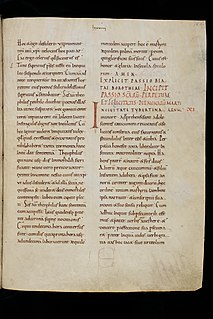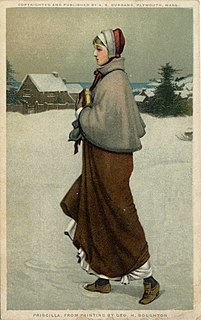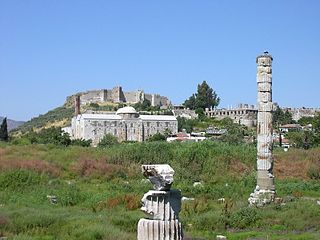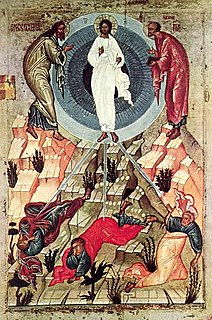Related Research Articles
In religion, a prophet or prophetess is an individual who is regarded as being in contact with a divine being and is said to speak on behalf of that being, serving as an intermediary with humanity by delivering messages or teachings from the supernatural source to other people. The message that the prophet conveys is called a prophecy.

Tertullian was a prolific early Christian author from Carthage in the Roman province of Africa. He was the first Christian author to produce an extensive corpus of Latin Christian literature. He was an early Christian apologist and a polemicist against heresy, including contemporary Christian Gnosticism. Tertullian has been called "the father of Latin Christianity" and "the founder of Western theology".

Montanism, known by its adherents as the New Prophecy, was an early Christian movement of the late 2nd century, later referred to by the name of its founder, Montanus. Montanism held views about the basic tenets of Christian theology similar to those of the wider Christian Church, but it was labelled a heresy for its belief in new prophetic revelations. The prophetic movement called for a reliance on the spontaneity of the Holy Spirit and a more conservative personal ethic. Parallels have been drawn between Montanism and modern-day movements such as Pentecostalism and the Charismatic movement.

Pope Soter was the bishop of Rome from c. 167 to his death in c. 174. According to the Annuario Pontificio, the dates may have ranged from 162–168 to 170–177. He was born in Fondi, Campania, today Lazio region, Italy. Soter is known for declaring that marriage was valid only as a sacrament blessed by a priest and also for formally inaugurating Easter as an annual festival in Rome. His name, from Greek Σωτήριος from σωτήρ "saviour", would be his baptismal name, as his lifetime predates the tradition of adopting papal names.

The Passion of Saints Perpetua and Felicity is a diary by Vibia Perpetua describing her imprisonment as a Christian in 203, completed after her death by a redactor. It is one of the oldest and most notable early Christian texts.
Quartodecimanism is the practice of celebrating Passover on the 14th of Nisan. Quartodecimans celebrated Passover instead of Easter. Some want to call the Quartodeciman controversy the "Passover-Easter controversy", because the debate was about if the main Christian festival should happen on a day of the month when he died on Passover according to John 19:1. which is referenced by Paul in 1st Corinthians 5:7 or on a specific day of the week (Sunday) as promoted by Rome when they confused the day of his Death with his Resurrection and used a pagan holiday instead of the actual day of his resurrection on the day of first fruits during the feast of unleavened bread. Quartodecimans would also not condemn celebrating the resurrection of Jesus on the day of first fruits outlined in Leviticus 23:10-11 which was always after the weekly sabbath during the feast of unleavened bread and spoken of by Paul in 1st Corinthians 15:23

The Alogi or Alogoi were a group of heterodox Christians in Asia Minor that flourished c. 200 CE, and taught that the Gospel of John and the Apocalypse of John were not the work of the Apostle, but his adversary Cerinthus. What we know of them is derived from their doctrinal opponents, whose literature is extant, particularly St. Epiphanius of Salamis. It was Epiphanius who coined the name "Alogi" as a word play suggesting that they were both illogical (anti-logikos) and they were against the Christian doctrine of the Logos. While Epiphanius does not specifically indicate the name of its founder, Dionysius Bar-Salibi, citing a lost work of Hippolytus, writes in his commentary on the Apocalypse,
Hippolytus the Roman says: A man appeared, named Caius, saying that the Gospel is not by John, nor the Apocalypse but that it is by Cerinthus the heretic.
Montanus was the second century founder of Montanism and a self proclaimed prophet. Montanus emphasized the work of the Holy Spirit, in a manner which set him apart from the Great church.

Priscilla is an English female given name adopted from Latin Prisca, derived from priscus. One suggestion is that it is intended to bestow long life on the bearer.

Apollonius of Ephesus was an anti-Montanist Greek ecclesiastical writer, probably from Asia Minor.

Christian mysticism in ancient Africa took form in the desert, as part of a long-reaching Judeo-Christian mystical tradition. In the Judeo-Christian mystical tradition, the desert is known to induce religious experiences and altered states of consciousness.

In Christianity, the figures widely recognised as prophets are those mentioned as such in the Old Testament and the New Testament. It is believed that prophets are chosen and called by God.
Tymion was an ancient town in Phrygia, Asia Minor. Its site is located at the Turkish village of Şükraniye. From the middle of the 2nd century CE to the middle of the 6th century CE, Tymion was an important town for the ancient Christian church of Montanism. The Montanists, whose church spread all over the Roman Empire, expected the New Jerusalem to descend to earth at Tymion and the nearby town of Pepuza; Pepuza was the headquarters of Montanism and the seat of the Montanist patriarch. One of the founders of Montanism, Montanus, called both towns "Jerusalem." In late antiquity, both places attracted crowds of pilgrims from all over the Roman Empire. Women played an emancipated role in Montanism. They could become priests and also bishops. In the 6th century CE, this church became extinct.
Zoticus was a 3rd-century martyr and bishop of Comana. Zoticus is known for his opposition to the Montanist heresy. He died in 204 a martyr. A life of Zoticus, the Vita Zotici, was written during the reign of Michael IV (1034–41). The town of Saint-Zotique, Quebec is named for him, as is Rue St Zotique in Montreal.
Marcellina was an early Christian Carpocratian religious leader in the mid-second century AD known primarily from the writings of Irenaeus and Origen. She originated in Alexandria, but moved to Rome during the episcopate of Anicetus. She attracted large numbers of followers and founded the Carpocratian sect of Marcellians. Like other Carpocratians, Marcellina and her followers believed in antinomianism, also known as libertinism, the idea that obedience to laws and regulations is unnecessary in order to attain salvation. They believed that Jesus was only a man, but saw him as a model to be emulated, albeit one which a believer was capable of surpassing. Marcellina's community appears to have sought to literally implement the foundational Carpocratian teaching of social egalitarianism. The Marcellians in particular are reported to have branded their disciples on the insides of their right earlobes and venerated images of Jesus as well as Greek philosophers such as Pythagoras, Plato, and Aristotle. Although the Marcellians identified themselves as "gnostics", many modern scholars do not classify them as members of the sect of Gnosticism.
Prisca, often written in the diminutive form Priscilla, was a 2nd-century A.D. foundational leader and prophet of the religious movement known today as Montanism based in the Phrygian towns of Pepuza and Tymion. She, along with the prophets Montanus and Maximilla, proselytized a form of Christianity in which the Holy Spirit would enter the human body and speak through it.
Quintilla was a Phrygian Christian prophetess within the movement known as Montanism. The sect of the Quintillians was named after her.
Blastus was a 2nd-century leader of the Roman Montanists, a presbyter in Rome and a Quartodeciman, however likely originally born in Alexandria. Blastus caused a schism in Rome about Easter and gained many followers. Some scholars have argued that the hostility of Pope Victor against the Quartodecimans, was caused by Blastus' schism. Blastus argued that Christians must keep Easter at the same time Moses commanded passover to be kept. Blastus was accused of judaizing the Church by pseudo-Tertullian. Irenaeus wrote a letter to Blastus called "on Schism" which is no longer extant.
Miltiades was a 2nd-century Christian, who wrote three treatises, "against the Greeks", "against the Jews" and an "Apology". He likely started writing before the death of Marcus Aurelius. Miltiades might have been associated with Montanism, however there is confusion on if he was a Montanist, this is because In Eusebius' writings, there appears to be confusion over the name "Miltiades" and "Alcibiades", either due to an error from copyists or from Eusebius himself. It is even possible that he might have written against Montanism.
References
- ↑ Jensen, Anne (1992). Gottes selbstbewußte Töchter : Frauenemanzipation im frühen Christentum?. Freiburg [u.a.]: Herder. ISBN 3-451-22597-2.
- ↑ Trevett, Christine (1996). Montanism : gender, authority, and the new prophecy (1st paperback ed.). Cambridge: Cambridge University Press. ISBN 0-521-41182-3.
- 1 2 3 Tabbernee, William (1997). Montanist inscriptions and testimonia : epigraphic sources illustrating the history of montanism (1st ed.). Macon, Ga.: Mercer Univ. Press. ISBN 0-86554-521-9.
- 1 2 Eusebius. Church History. Viewable at: http://www.newadvent.org/fathers/250105.htm
- ↑ Klawiter, Frederick Charles (1975). The new prophecy in early Christianity: the origin, nature, and development of Montanism, A.D. 165-220. Chicago, Ill: University of Chicago.
